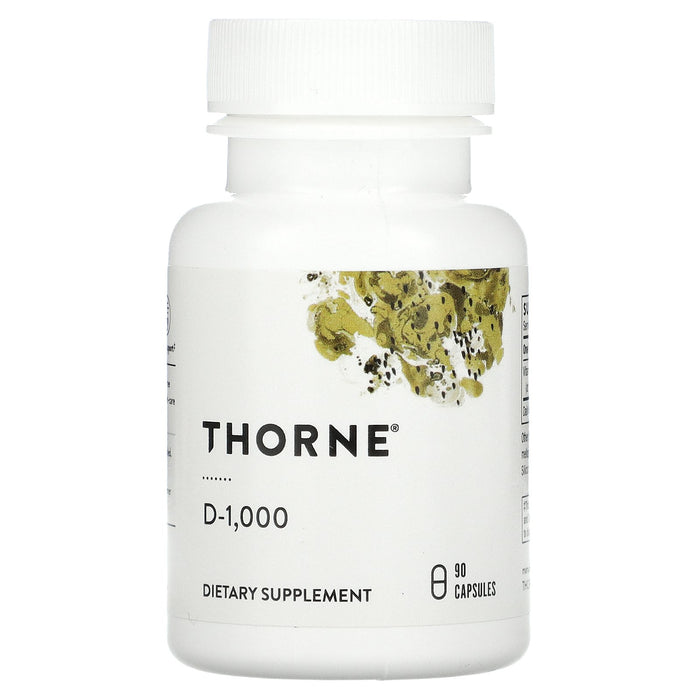




| Serving Size: 1 Capsule | ||
| Servings Per Container: 90 | ||
| Each Capsule Contains |
% Daily Value | |
| Vitamin D (as Vitamin D3)(1,000 IU) |
25 mcg |
125% |
Boost your vitamin D levels with Thorne Research D, a vitamin D3 supplement.
D is a gluten-free vitamin D supplement that supports healthy bones, muscles, cardiovascular function, and immune function. Unlike many vitamin D supplements, this formula contains no lactose or preservatives, making it ideal for individuals sensitive to those ingredients.
Take 1 capsule one to three times daily or as recommended by your health-care practitioner.
Microcrystalline cellulose, hypromellose (derived from cellulose) capsule, leucine, silicon dioxide, vitamin E (d-alpha tocopheryl).
Tamper Evident: Use only if bottle is sealed.
Store tightly sealed in a cool, dry place.
If pregnant, consult your health-care practitioner before using this product.
At Health Orchard, we are committed to providing accurate product information and images. However, manufacturers may update their product packaging or ingredients, and these changes may not be immediately reflected on our website. It's possible for products to be shipped with different packaging than what is shown online. For the most accurate and safe use of any product, we advise reading the product's label, warnings, and instructions rather than relying solely on the details provided by Health Orchard.
Thorne Research is generally considered a reputable brand in the supplement industry, known for its high-quality products. Their vitamin D supplement is no exception. Thorne is known for using pure ingredients and conducting thorough testing. However, as with any supplement, individual experiences may vary, and it's important to choose products that suit your specific health needs.
Vitamin D plays a role in overall health, including kidney function. While Thorne Research, D is not specifically marketed for kidney health, maintaining adequate vitamin D levels is important for overall well-being.
Thorne Research, D is primarily used to support bone health by aiding calcium absorption. It also plays crucial roles in immune function, mood regulation, and muscle strength. Some research suggests vitamin D may have benefits for heart health and may help reduce the risk of certain chronic diseases. It's particularly important for people with limited sun exposure or those at risk of vitamin D deficiency.
Thorne Research, D offers several potential health benefits. It supports bone health by promoting calcium absorption and bone mineralization. Vitamin D is crucial for immune system function, potentially helping to reduce the risk of infections. It may also support muscle strength and balance, which is particularly important for older adults. Some studies suggest vitamin D may play a role in mood regulation and cognitive function.
Taking Thorne Research, D daily is often recommended, especially for people at risk of vitamin D deficiency. However, the appropriate dosage can vary based on individual factors such as age, sun exposure, and overall health status. It's important to follow the dosage instructions on the product label or as advised by a healthcare provider. Regular blood tests can help determine if your vitamin D levels are within a healthy range.
When taken as directed, Thorne Research, D is generally well-tolerated. However, taking excessive amounts of vitamin D can lead to side effects. These may include nausea, constipation, weakness, and in severe cases, kidney problems due to elevated calcium levels in the blood. It's crucial not to exceed recommended dosages without medical supervision.